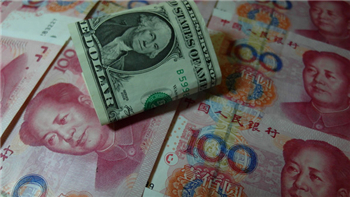
It is not easy being a bear on China — at least, not this month. Data, events and even market moves are conspiring to complicate what, just a month ago, looked to be a relatively simple story. And yesterday the most hard-to-fudge part of the “sell China” case, namely rising capital outflows, also confounded forecasts by slowing sharply. Bears may shrug, but they should tread carefully, too.
卖空中国不容易——至少本月不容易。数据、事件甚至市场变动的共同作用,正使得一个月前看起来还相对简单的故事复杂化。昨天,“卖空中国”理由中最难以蒙混过关的部分——资本外流加剧——也证明预测并不准确;中国的资本外流已大幅放缓。卖空人士可能会对此耸耸肩,但他们也应该谨慎行事。
China’s foreign exchange reserves fell by $28.6bn last month, far less than the near-$100bn run-rate of the past few months. The lunar new year holiday in the middle of February will have played a part, but market moves also suggest the country has succeeded in diluting January’s strong “sell China” narrative. The offshore renminbi — considered the gauge of international sentiment — has in the past four weeks spent more time trading more strongly against the dollar than the tightly controlled onshore rate than at any time since last August’s surprise devaluation.
上月,中国的外汇储备下降了286亿美元,远低于过去几个月每月近1000亿美元的水平。2月中旬的春节假期可能有一定的影响,但市场变动也表明,中国已成功地冲淡了1月强劲的“卖空中国”叙事。相比受到严格控制的在岸汇率,被视为国际情绪风向标的离岸人民币兑美元汇率,在过去4周里比自去年8月意外贬值以来的任何时候都更强势。
Shorting the renminbi is based on the argument that China is running out of liquid reserves with which to combat identifiable and intensifying capital flight. Both parts of that case were also dented at the weekend. The People’s Bank of China asserted that its reported reserves are in fact liquid, in an effort to quell doubts. It may or may not succeed. But few will be able to as easily shrug off research published this week by the Bank for International Settlements that suggested third-quarter outflows last year — that is, immediately after the August brouhaha — were due mostly to companies paying off dollar debt, and to a reduction in offshore deposits, than a scramble for the exits by panicked mainlanders.
做空人民币的依据是:中国正在耗尽高流动性储备,后者可用来应对可识别的、不断加剧的资本外流。上周末,这两点都遭到了削弱。为了平息质疑,中国人民银行(PBoC)断言,其报告的外汇储备实际上只包括高流动性资产。此举可能(也可能不会)成功。但很少有人能同样轻易地对国际清算银行(BIS)本周发布的研究不屑一顾,该研究称,去年第三季度的资本外流——也就是说,紧随8月的汇率风波——主要原因在于企业偿还美元债务以及境外存款减少,而非惊慌失措的内地人士竞相把资金转移出境。
Selling the renminbi is only one way of expressing negative views on China — and it is not the most popular since the PBoC intervened heavily in January, sharply raising the cost of the trades. China is not likely to do anything if hedge funds instead sell proxies such as the Australian dollar or the South Korean won, as they have been doing. But if China’s reserves are as liquid as it says and the outflows do not return to their previous rate, the bears will have to think more carefully about their base case. What promised to be one of the few big trends of the year — namely selling China — now needs careful watching.
卖出人民币只是表达对中国负面看法的一种方式,而自1月份中国央行大举干预、大幅提高此类交易成本以来,这已不再是最受欢迎的方式。如果对冲基金转而卖出澳元或韩元(正如他们一直在做的),中国不太可能采取任何行动。但是如果中国的外汇储备像其所称的那样具有流动性,而资本外流不再回到此前的水平,那么卖空者将不得不更慎重思考自己的基本预测。“卖空中国”曾经有望成为今年为数不多的大趋势之一,现在则需要审慎观察。












